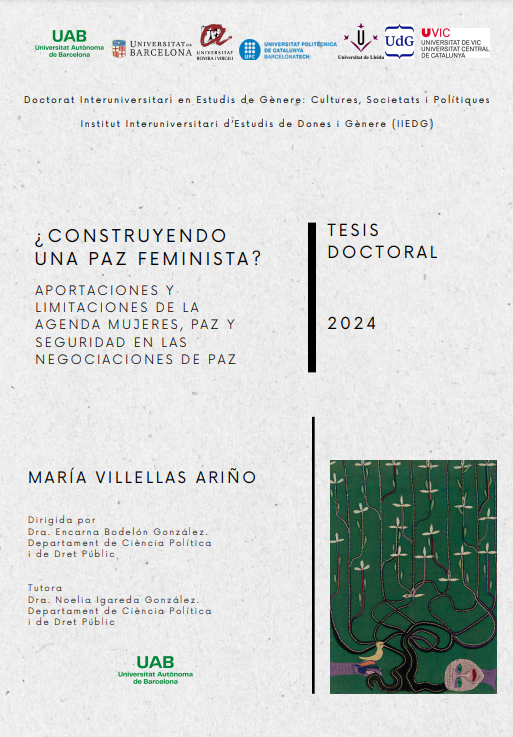Doctoral thesis defense of María Villellas Ariño
¿Construyendo una paz feminista? Aportaciones y limitaciones de la agenda mujeres, paz y seguridad en las negociaciones de paz

This thesis analyzes from a feminist perspective whether resolution 1325, approved by the UN Security Council in 2000, and the agenda on women, peace and security have had an impact on the formal negotiation processes in armed conflicts that have occurred after its approval. To this end, it has been analyzed whether they have had an impact on the configuration of the negotiation agendas of peace processes that occurred after its approval. Secondly, it has been studied whether the resolution and the agenda have influenced the actors participating in the peace negotiations, and specifically it analyzes what has been the impact of the agenda on women, peace and security in the field of mediation, facilitation and accompaniment by third parties to peace processes and how this influence has occurred. Finally, we have analyzed how women's participation in peace negotiations has materialized, examining different examples of gender architecture in peace processes. The research carried out has allowed several conclusions to be reached. Firstly, that resolution 1325 and the women, peace and security agenda have influenced the configuration of the negotiation agendas of peace processes that occurred after its approval, and this influence has increased since its beginning in 2000. This agenda has promoted the participation of women and this participation promotes peace agreements with a gender perspective. However, it has not been able to achieve its potential for influence and transformation, as shown in examples such as Colombia. The agenda has contributed to reducing some obstacles to women's participation and the inclusion of gender equality in peace processes, but it has not managed to completely eliminate structural barriers that prevent negotiations from being permeable to proposals related to recognition of women's rights and the construction of a feminist peace. Secondly, some of the central challenges and gaps that persist in achieving mediation and facilitation efforts that integrate the gender perspective in all its transformative potential are pointed out. The international context of the preeminence of liberal peace in an international order marked by neoliberalism and neocolonialism frames these difficulties, constraining this emancipatory potential. Dilemmas intrinsic to mediation practice also persist, as the values ¿¿and norms promoted by mediating actors can be perceived as political agendas. Finally, it concludes that gender architectures offer spaces for collective articulation for women to influence the results of negotiations and guarantee the right to participation established in the women, peace and security agenda, but the challenge of connecting these spaces with local feminist agendas persists. The transformative and emancipatory potential of the women, peace and security agenda is multiplied when the strengths of an internationally accepted and extended normative framework are added to those of a local movement with knowledge of the context and the relevant needs for women and a practical and feminist action.
Date: 18/07/24, 12h
Sala Juntes
Place: B3BIS/-121
Facultat de Ciències Polítiques i de Sociologia